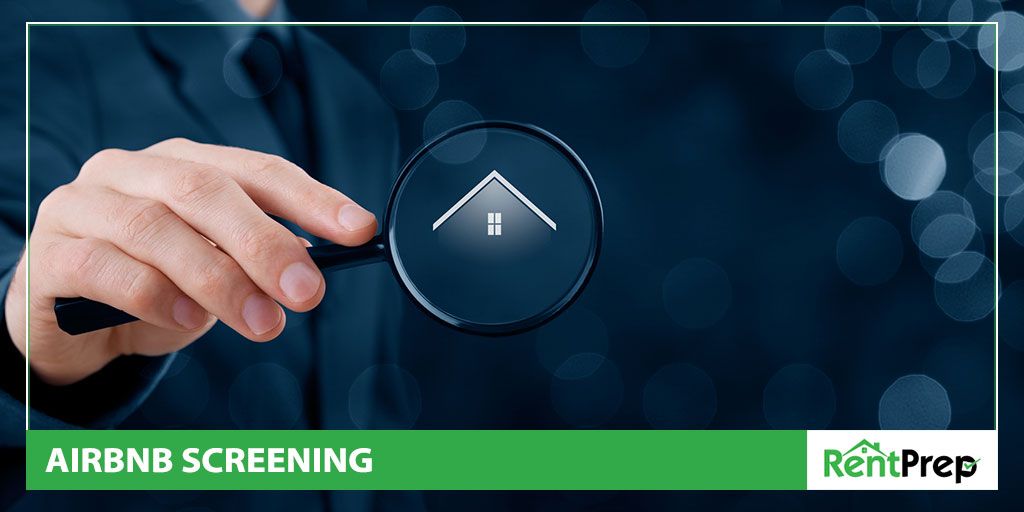
When property owners first get started on short-term leasing sites like Airbnb, they often don’t think about reviewing guests before accepting them. They may not realize that Airbnb guest screening is something many property owners do before approving a reservation, and that this is an essential part of the process to keep your property in good condition.
However, Airbnb guest screening is a bit different from standard tenant screening. After all, are Airbnb guests actually tenants, or are they considered a different category altogether?
Suppose you don’t know exactly how to screen guests or what rules and laws apply to their rental period. If so, you could be setting yourself up for future difficulties. From property damage to lost funds, you might not like the outcome if you don’t adequately screen prospective guests.
Today, learn more about the Airbnb screening process used by successful property owners worldwide.
A Table Of Contents On Airbnb Screening
Whether you’re planning on renting your property temporarily or to do short-term rentals as part of your rental business, it’s important to learn more about guest screening. Here’s what we’ll cover today:
- All About Short-Term Rentals
- Is Short-Term Rental Screening Important?
- How To Screen Guests And Short-Term Tenants
- Airbnb Guest Screening FAQs
- Get Your Rental Booked ASAP
All About Short-Term Rentals
What exactly are short-term rentals, and what role do they fill in the rental marketplace?
Types Of Rentals

Most people think of short-term rentals as vacation rentals. For a few days to several weeks, people can rent out an apartment or other type of property as their own. And just as longer-term tenants have specific rights and responsibilities, the same applies to guests in short-term rentals.
That said, while vacation rentals are a common and widespread type of short-term rental, they are not the only type.
Another kind of short-term rental is for a few months rather than a more standard lease period of one year. Many landlords prefer to stick to longer leases so there’s less turnover, but some markets are well suited to short-term leases for business travelers, students, and other transitional individuals.
Airbnb Rentals vs Short-Term Leases: What’s The Difference?
Comparing the particulars of short-term rentals to short-term leases is exciting and vital for landlords.
When hosting short-term renters through a site like Airbnb, you don’t create a specific contract with guests. Instead, the contracting work is done through a third party. In this case, Airbnb is in charge of the contracts and mitigation. Airbnb will be a significant part of the resolution and problem-solving process should an issue arise.
A short-term lease on the other hand is a contract between you and a tenant. While this can be a verbal contract, it’s typically done as a written agreement. The lease terms are determined by the tenant, local laws, and your own business terms. Both parties are held accountable for those terms.
Additionally, most properties hosted on sites like Airbnb are furnished and stocked to be more like a bed-and-breakfast or hotel experience. While the amenities aren’t usually as comprehensive as those at a hotel, guests expect more than what they would get from a typical housing rental.
However, this varies and once again can be determined by the listing on a third-party hosting site or through your management of short-term leasing options.
Airbnb vs Other Short-Term Rentals
Another important note is that the terms of service and arrangements provided on different hosting sites will vary. Airbnb, for example, will require property owners to follow a specific rental procedure, while the process on VRBO is different. There are usually enough similarities that using both sites for a single rental isn’t impossible, but most property owners prefer only to learn one of the rental processes.
Below, we’ll talk more about how guest screening differs between these rental hosting sites.
Is Short-Term Rental Screening Important?
Even when renting for just a few days or weeks, owners are often concerned about their properties. How can you be sure your guests will be respectful of your property and not leave you with a headache?
Third-party sites typically require a deposit and provide insurance to property owners in the case of damages. But it’s still preferable to avoid these issues altogether.
Airbnb Guest Screening
Short-term hosting companies like Airbnb typically require users to complete a brief screening before using the site. This process usually ensures at least a couple things:
- That the user is real
- That the user has a valid, verified address
Airbnb requires that users set up and verify their account with an email address and phone number. Additionally, most users will need to provide their ID to be able to rent on the platform. This is done by uploading a copy of an ID, which is then verified by Airbnb. Hosts can require that their guests complete this process.
While Airbnb doesn’t typically do any type of background check or credit screening, their terms of service make it clear that Airbnb reserves the right to do so. However, it’s not common for this policy to be enforced.
Another way that Airbnb provides some type of screening is with both guest and host reviews. The hosts of short-term renters can leave a review of their guests, and these guest reviews are visible to other hosts. This network of reviews gives hosts something to view when considering their next rental request.
VRBO Screening vs. Airbnb Guest Screening
Unlike Airbnb, VRBO does not give hosts the option to require their guests to have a verified ID on file. Hosts can choose not to rent to those who haven’t completed this ID check, but this isn’t as explicit as it is on Airbnb.
Most experts agree that the guest verification process on Airbnb is more robust than VRBO, but this process is constantly changing so it’s essential to verify what screening is being done if you decide to use these sites.
How To Screen Guests And Short-Term Tenants
Since the tenant screening practices used by online travel agencies like Airbnb are not robust, most property owners have their own process in place to ensure their bookings are successful.
Here’s how to screen guests and short-term tenants found through Airbnb and similar services.
#1: Site-Specific Verification
The first thing you want to do is ensure the guest has registered their name, email address, phone number, and ID on the site. Guests who are willing to be verified are less likely to be hiding something, which is good for you.
#2: Review Guest Profile And Reviews
Next, click on the profile of anyone who requests to book your property. Read through what they have written. Have they completed the profile? Do they seem trustworthy? Not every guest will fill out their profile completely, but many will provide at least some level of detail about themselves so that you can make a better decision on their booking request.
Additionally, you’ll want to look at any guest reviews on their profile. These reviews are written by previous hosts and will give you an idea of how the guest treats rented property.
#3: Additional Communication

Finally, you may want to ask the guests to give you a bit more information about themselves, their upcoming trip, and why they are interested in staying in your rental. The answers to these questions can give you an idea of their priorities and help you decide if they’ll be a good fit.
However, remember that you cannot ask any questions that violate discrimination laws. You cannot ask about marital status, religion, disabilities, or any other protected classes. Keep your questions relevant to the rental terms and not to these personal details.
Before approving a booking, communicating with the potential guest is also a great way to clarify your most important policies. For example, if you have a no pets or no parties policy in place, you can reiterate this before approving a booking. This can prevent any confusion and solidify that you’ve given fair notice of your rules.
Learn More About Tenant Selection
Here at RentPrep, we consider ourselves to be experts on tenant screening. It’s what we do best, and we love sharing our knowledge with landlords, property managers, and property owners who need to be sure they’re entrusting their property to the right people.
By signing up for our newsletter, you can get the latest information about renting, tenants, and tenant screening delivered straight to your inbox. Sign up with your email today.
Airbnb Guest Screening FAQs
Has COVID-19 changed how to screen Airbnb guests?
Many property managers have dealt with changing procedures and regulations during the COVID-19 pandemic. In many areas, updated guidelines are still in place to ensure the safety of everyone involved in the short-term rental process.
First, you’ll want to review any active policies on Airbnb or similar short-term rental sites. While these sites typically defer to local mandates, they may have additional, stricter policies that property owners must comply with to use the rental service.
Additionally, you should always check local mandates to determine if your short-term rentals are affected by any new policies. These policies are enforced at the local level and could affect your ability to manage short-term leases in the future, so be sure to stay up-to-date with the latest news.
Does Airbnb do background checks on guests?
It is hard to know whether or not Airbnb screens every user who signs up, but Airbnb reserves the right to screen anyone according to their terms of service. Airbnb’s statements suggest that they run their users’ names through specific databases, but the exact process is unclear.
VRBO, on the other hand, doesn’t run background checks, although their policies contain similar language, which gives them some rights to look up background information on users as needed.
Are Airbnb guests or tenants?
The answer to this question can be complicated. “Guests” is the term that Airbnb and most property owners use to refer to individuals who book their short-term rentals through the site.
However, some of these guests would also be considered tenants under local laws. Some states and municipalities require that anyone staying in a short-term rental property for more than 30 days is considered a tenant and has tenant’s rights.
Whether or not that applies in your area will depend on local short-term rental laws. Most places have specialized rules for this type of rental service due to its popularity, so you should be able to find the information you need.
Get Your Rental Booked ASAP
If you’re ready to start making extra income with short-term rentals, you want to get started as soon as possible and keep the profits coming in. However, don’t forget to have a high-quality guest screening process in place before accepting any bookings. Otherwise, you’ll be giving rental permissions to guests who could potentially be problematic.
Reduce your risk by doing the following:
- Use an online travel agency with good screening options
- Require ID verification when possible
- Ask guests questions to ensure they’re a good fit
- Make your house rules clear to prevent misunderstandings before booking
Guest screening is just as important with short-term rentals as it is when renting out property for a year or longer. Avoid giving unscreened individuals access to your property at all costs – it will save you money, time, and stress.

